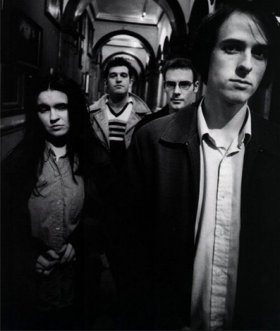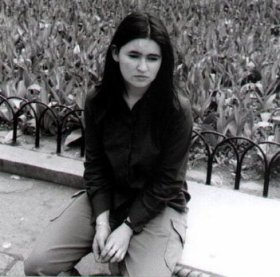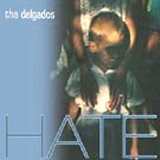
http://www.kindamuzik.net
ernaast
Onze laatste liverecensie.
Onze laatste albumrecensie.
Ons laatste interview.
Onze laatste video.
The Delgados - We focus on the negativity of life
Where do they get the time? The Delgados run the record label Chemical Underground and also just made a new record. And not just a record: Hate is the contrast between the beauty of fully arranged music and the focus on the negative part of life. Emma Pollock writes the songs, together with Alun Woodward, and she gives us insight into the Delgado way of thinking. "Hate is also responsible for the progress of the world."
Tekst: Norbert Pek
Publicatiedatum: 25 september 2002
 Why is a beautiful and sensitive album called "Hate"?
Why is a beautiful and sensitive album called "Hate"?
"Well, it's really the fact that some aspects of life have to do with that. Like
the struggles of people and the negative emotions in life. They are important as
well. Alan and me are the writers of the Delgados, and we both have the same
perspective on life, so we end up with a certain thought. We discussed it and
decided that Hate was a good name for the whole album. It's hard to explain. But
people have to listen to the lyrics to really understand it."
And the track All You Need Is Hate seems to attack the golden All You Need Is
Love. A new perspective?
"It's not that simple; I think we see it as a game. We focus on the whole
negativity of life. In this song we like to give a contrast. You notice this
when you compare the friendly chorus with the harsh lyrics."
Do you think there is more hate in people than love?
"Yes, sometimes I do. When there is a lot of stress in people, it's easy to
hate. This is also with the Delgados. We work very hard under stress, and
sometimes we're also victims. But not that it's a bad thing. Hate is also
responsible for progress of the world."
Is it a typical Scottish thing? In Trainspotting, everyone also hates
everything, except for drugs and music.
"I suppose so. On Trainspotting, it does seem they present the nature of the
Scottish life. But I must say that life in Scotland isn't dreadful at all. So
that's not Scottish. But in the movie, there is a lot of attention to the people
who have no focus in their lives and who are struggling with a lot of
difficulties. That isn't the same thing as we have. What we do is to actually
try to represent emotions. The movie is also ironic, by the way."
Aren't Delgados also sometimes ironic?
"Well, we do take everything we write very seriously. But there is humour in it
as well. It can't be all that bad. There's nothing worse than someone who never
sees the light. But as I said: We do take everything very serious. It's our
passion."
Right now there's a blooming Scottish music scene. Does a Chemical
Underground or Mantra release automatically receive a lot of attention?
"No, we have to work very hard. Chemical Underground is a respected label, but
we don't sell a lot of records. In Britain it's hard to have a breakthrough.
Mostly because the media is a lot smaller at the moment; a lot of magazines are
closing down. Now it's becoming more difficult to get attention. It seems to be
that all publishers are most interested in reaching as many readers [as
possible]. It's hard for a genuine artist to get into such a magazine. I guess
it just all comes down to making money. Well, these people have the power and
freedom to write about something. They want to make the advertisers happy. What
we hope for is an individual who really respects and loves our music and writes
something about it. Then he cares so much about the music that he makes it The
Band.
Another difficult thing for us: Chemical Underground isn't a major label, so
they also think we can't back up attention in the press with a lot of
marketing."
 Hate is released on the Mantra label. Wasn't it strange to work for another
label but your own?
Hate is released on the Mantra label. Wasn't it strange to work for another
label but your own?
"Well, it wasn't that difficult, because Mantra has been doing the Delgados all
of the time, around the world. And now they do the Delgados in the UK as well.
So they're busy with the marketing and the tour support. We can approve of some
things, but we don't decide everything anymore. We can't spend as much money as
we want."
Was it really necessary to avoid your own label?
"There weren't enough resources to release the Delgados album on Chemical
Underground. We didn't have enough cash flow in addition to other bands on the
label. It just was impossible to do everything we wanted. We didn't have the
freedom to keep on spending money."
Are you going on tour with the string section again then?
"I think they'll be with us as much as we can manage. When they play with us, we
represent the accuracy of the record. In Britain they will certainly be with us.
But for the rest of Europe, it is quite expensive. But when we play without
them, we'll do an extra thing to compromise — that's inevitable. We will
play more aggressive."
The string section was on the last two albums and also on your last tour. Do
you still consider The Delgados a four-piece band?
"I still do. We are a group of four individuals who write music. We're really a
band. The other musicians enter much later."
First I thought Hate sounded quite like The Great Eastern, but I noticed the
music is more prominent, like it's for a soundtrack. Do you agree?
"Well, that's funny you say that. Last year we were invited to write a
soundtrack for an artist named Joe Coleman. He paints pictures of people, a kind
of visual biographies. About people with colourful but tragic characters, with
troubled pasts. His work is really hard to stomach for a lot of people; it does
not compromise. He is also well respected by celebrities like Johnny Depp and
Leonardo DiCaprio; they collect his work. We received a tape of his work and
made three instrumental tracks. We played at an exhibition of him and it was a
real success. But we also used the music we made there on the album."
I guess that's also where the song Woke From Dreaming was born?
"That's quite interesting you think that. Well, it's very instrumental, that's
true. But it's written afterwards on the piano. One-and-a-half years ago, we
bought one. I really can't play, but I'm learning. I'm really pleased by it. But
the basics of the song are written on that piano."
 When you listen to the noisy rock parts on Domestiques, do you still consider
The Delgados a rock band?
When you listen to the noisy rock parts on Domestiques, do you still consider
The Delgados a rock band?
"There are still elements when we use guitar, bass, and drums, like an ordinary
guitar band. But the music now is more complex, there are more dynamics. When a
song is written, you also think about what to do with the other instruments."
When I attended a Delgados gig in Holland, Alun was really mad at the people
who made noise during the songs. How do you want a live audience to respond to
your music?
"To be as moved as we are when we play live. There is always more excitement;
you don't know what's going to happen. A song can sound different every time. We
want the people to get something out of the music. But we also want to represent
the sound of the album."
What can we expect from the forthcoming shows?
"We try to make the songs sound really good onstage, but then with a lot more
volume of course. We want to reach the same intensity. We have a lot of material
now, but we will mostly play songs of The Great Eastern and Hate, because that's
more of the sound we want to reach. It's hard to fit the songs from Domestiques
and Peloton in there."
I do hope you play Pull The Wires From The Wall.
"Well, we haven't decided yet. I guess we'll pick some songs from Peloton. But
it's also possible we only do it in the encore. But you can't do them all. I
don't think we can do two hour shows all of the time."
Don't you get enough of always the same band members/colleagues?
"No, it's good to combine. It's always been like that. We're a group of people
with a common goal. We started something together, and we're trying to make the
best of it. Sure, sometimes there's stress and we do have arguments. But that
doesn't matter, because we know each other so good. The additional musicians are
also no problem. On the contrary, we have a great relationship. When we go on
tour, the atmosphere is excellent."
Is it also possible to combine running a label and touring with the
Delgados?
"Well, we have three extra people working at Chemical Underground. Graham
manages all the sets, Andrew does the international stuff and Alice does a lot
of things, like the promotion. So they're a great backup when we go on tour."
http://www.kindamuzik.net/interview/the-delgados/the-delgados-we-focus-on-the-negativity-of-life/1886/
Meer The Delgados op KindaMuzik: http://www.kindamuzik.net/artiest/the-delgados
Meer The Delgados op KindaMuzik:
» Live-recensie: The Delgados» Interview: The Delgados: "Lezen over muziek kan me geen bal schelen"
» Bezoek de The Delgados artiestpagina
Vind je The Delgados goed? Lees dan ook bij KindaMuzik over:
» zZz» Belle and Sebastian
» Teenage Fanclub








Deel dit artikel: